Manage Nerdio Manager Copilot
Nerdio Manger Copilot leverages an AI-based assistant to quickly search for information about Nerdio Manager, its features, and functions.
Enable Nerdio Manager Copilot
Notes:
-
Availability of Azure OpenAI services is limited and varies by Azure region.
-
When enabling Copilot, you might have to register the following resource providers first. Otherwise, you might see this error message:

-
EventHub
-
EventGrid
-
BotService
-
ServiceBus
-
AppConfiguration
-
Microsoft.Search
-
To enable Nerdio Manager Copilot:
-
In Nerdio Manager, navigate to Settings > Nerdio environment.
-
In the Nerdio Manager Copilot tile, select Deploy.
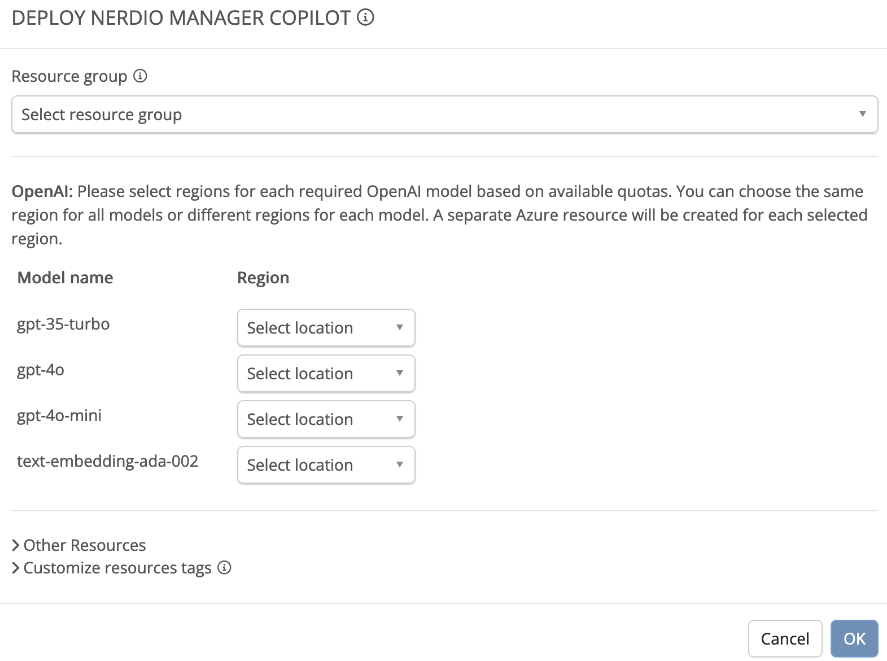
-
Enter the following information:
-
Resource group: From the drop-down list, select the resource group to contain all the resources required to run Nerdio Manager Copilot.
-
Model name-Regions: From the drop-down lists, select the regions for each required OpenAI model based on available quotas.
Note: You may select the same region for all models or different regions for each model. A separate Azure resource is created for each selected region.
-
Other Resources: Optionally, expand this to enter other resources.
Note: A partial list of Other resources is displayed here:
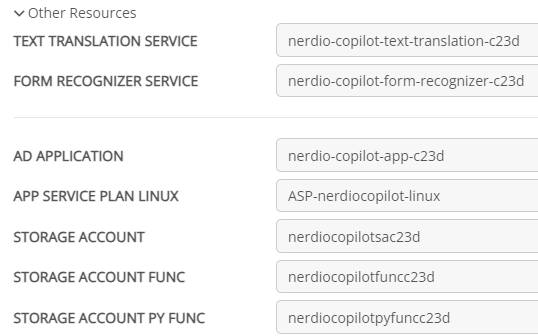
-
Customize resources tags: Optionally, expand this to enter custom tags.
-
-
Once you have entered all the desired information, select OK.
The deployment task starts and takes about 30-35 minutes depending on the Azure region and other conditions. You can follow the task's progress in the Settings Tasks section.
Use Nerdio Manager Copilot
Once all Azure resources for Copilot are deployed, you may use Copilot.
Note: Nerdio Manager Copilot caches the Nerdio Help Center KBs to answer your questions and refreshes the cache on a daily basis.
To use Nerdio Manager Copilot:
-
In the upper-right corner of Nerdio Manager, select the Nerdio Manager Copilot
 icon.
icon.Nerdio Manager connects to the bot and downloads the chat history.

-
Ask any question related to Nerdio Manager and send them to Copilot.
After a short period of time, Copilot displays an answer.
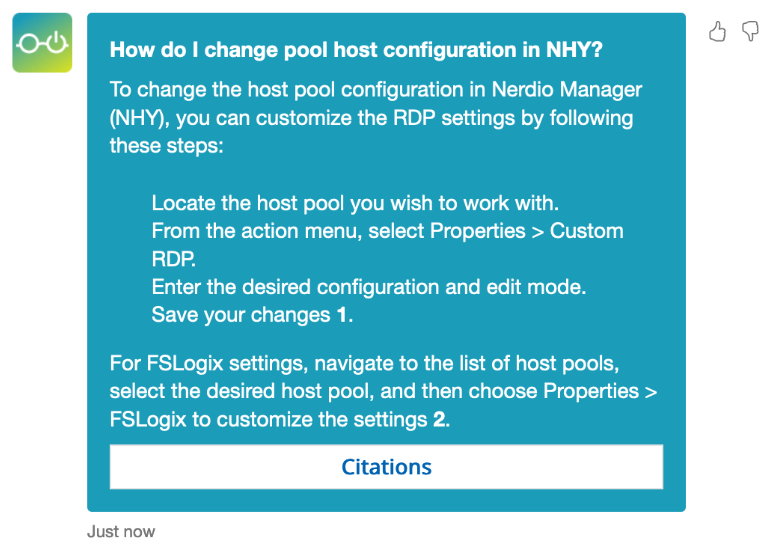
-
Optionally, select Citations to view a list of cited Knowledge Base articles.
-
You may select any of the view options:
-
Switch to sidebar window:

-
Switch to detached window:

-
Manage Nerdio Manager Copilot's chat settings
You may adjust Copilot's settings at any time.
To manage Nerdio Manager's Copilot's chat settings:
-
Select the Settings
 icon.
icon. -
Enter the following information:
-
Intent recognition service OpenAI Model: From the drop-down list, select the desired model.
-
Max days to retain history: Enter the number of chat histories to retain.
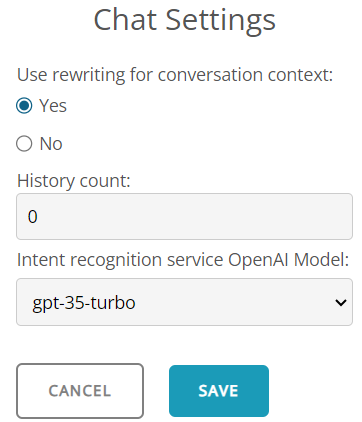
-
-
Once you have entered the desired information, select Save.
-
When prompted, select Confirm to confirm your changes.
Submit feedback
Copilot uses Azure OpenAI, powered by Large Language Model (LLM) that has been augmented with Nerdio-specific information. Due to this being an LLM, answers are not deterministic. For more details, see Introduction to large language models.
When you notice an incorrect answer, you can submit feedback in the following ways:
-
Select the Like or Unlike icon near the answer.

-
Enter a comment (optional).
-
Follow Nerdio’s standard support escalation path.
Disable Nerdio Manager Copilot
Follow this procedure to disable Nerdio Manager Copilot.
Note: Disabling Nerdio Manager Copilot removes all the Azure resources that were deployed when the feature was enabled, except for the Smart detector alert rule.
To disable Nerdio Manager Copilot:
-
In Nerdio Manager, navigate to Settings > Nerdio environment.
-
In the Nerdio Manager Copilot tile, select Disable.
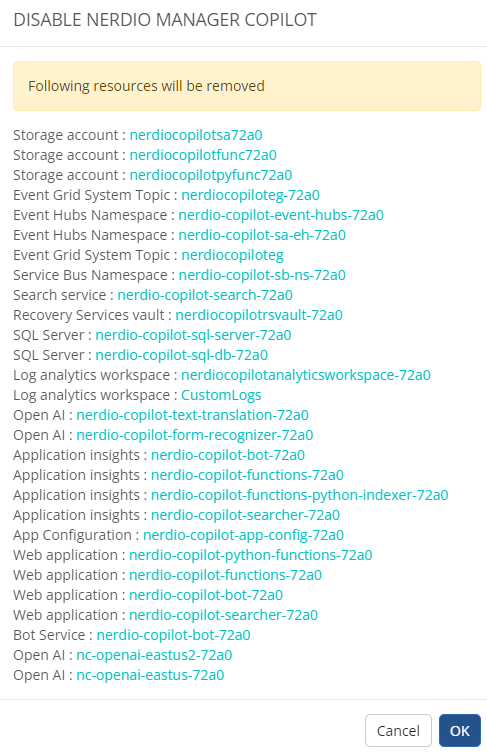
-
When prompted, select OK.
The disable task starts and takes about 6-12 minutes depending on the Azure region and other conditions. You can follow the task's progress in the Settings Tasks section.
Build scripts with Nerdio Manager Copilot
Note: This feature is in Public Preview.
Nerdio Manager Copilot includes Script Pro, which allows you to build scripts with Copilot.
Warning: Ensure that all AI-generated scripts are tested and validated manually before deployment to your production environments.
To build a script with Nerdio Manager Copilot:
-
Open Nerdio Manager Copilot.
-
Ask a question related to building a script. For example:

-
Follow the prompts and reply as needed.
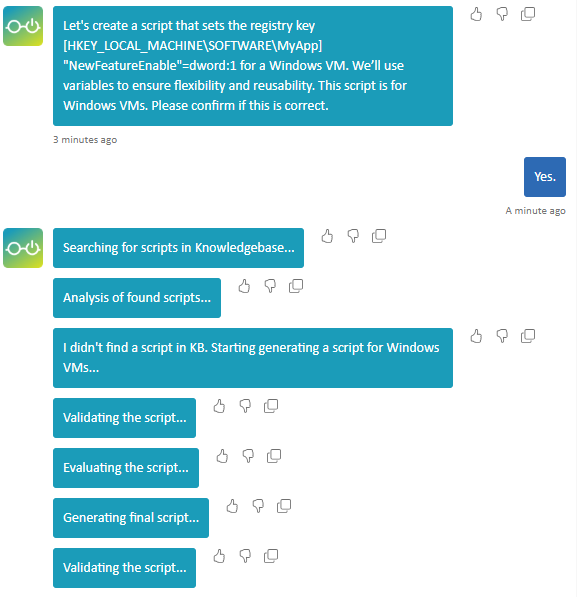
-
When the script is generated, copy the code.
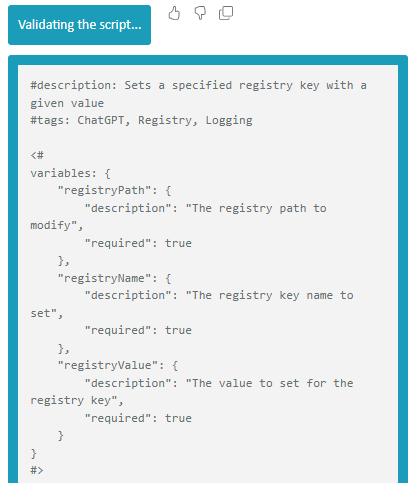
Generate KQL queries with Nerdio Manager Copilot AnalyticsPro
AnalyticsPro, is a powerful new tool within Nerdio Manager Copilot that transforms your natural language questions into Kusto Query Language (KQL) queries. With AnalyticsPro, you can effortlessly generate KQL queries thatycan be executed in your Azure Log Analytics workspace, unlocking valuable insights from your data without needing to master complex query syntax.
To generate a KQL query using AmalyticsPro:
-
Open Nerdio Manager Copilot.
-
Enter the details of the KQL query you want to generate. For example:
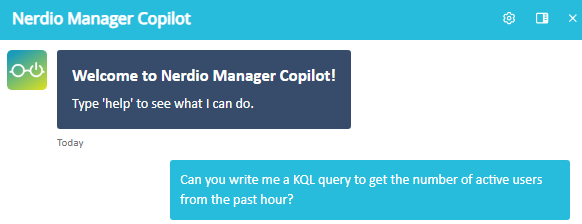
-
Select the send
 icon.
icon. -
The KQL query is generated
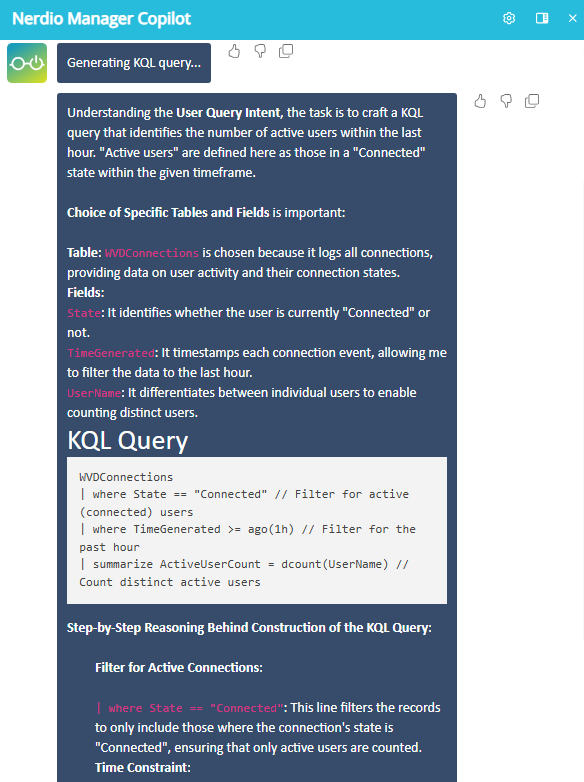
-
You can interact with AnalyticsPro and ask for additional information based on the results, or provide options to help refine your query. Respond to these prompts as needed to tailor the query to your specific requirements.
-
Once complete, you can copy the query and run it in your Azure Log Analytics workspace.
Warning: Ensure that all AI-generated queries are tested and validated manually before deployment to your production environments
Cost of Nerdio Manager Copilot
The estimated cost for Nerdio Manager Copilot when using out of the box, and with up to 5 users asking 5 questions per day, is about $35 per month.
Copilot has the following paid components:
-
Azure App Service
-
Azure Event Grid
-
Azure Event Hub
-
Azure Service Bus
-
Azure Search Service
-
Azure SQL Server
-
Azure Text Translation
-
Azure Form Recognizer
-
Azure OpenAI Services
-
Azure Bot Service
-
Azure Application Insights
-
Azure Functions
-
Azure App Configuration
-
Azure Storage
Here are the details on how you can get the exact cost of Copilot:
-
App Service: The price depends on the App Service plan that Nerdio Manager Copilot is using. The default plan is B2 (Linux). See the following Microsoft article for more details.
-
Azure OpenAI ServiceThis service’s cost depends on usage of Copilot and the number of input and output tokens that are being used in each interaction. See the following Microsoft article for more details.
-
Azure AI Search: Copilot uses the basic tier for this service that is priced at $0.11 per hour , which is approximately $80 per month. See the following Microsoft article for more details.
-
Azure Event Grid: The Event Grid Basic tier is priced as pay-per-use based on operations performed. The detailed pricing info is here.
-
Azure Event Hub: The basic tier pricing starts from $0.015/hour per Throughput Unit (about $12/month). The detailed pricing info is here.
-
Azure Service Bus: The basic tier pricing starts from $0.05 per million operations. The detailed pricing info is here.
-
Azure SQL: Standard service tier (S0), Max storage: 250 GB, which is about $14.7187/month
-
Azure App Configuration: In Standard tier, this service charges $1.20 per store per day, plus an overage charge at $0.06 per 10,000 requests. The monthly charge expects to be no more than $36. See the following Microsoft article for more details.
-
Azure Text Translation: This uses tier S1 – Pay as you go (Standard Translation - $10 per million characters, Custom Translation - $40 per million characters). Here is the pricing page.
-
Azure Form Recognizer: This uses tier S0 - Pay as you go (minimal charge is: 0-1M pages - $1.50 per 1,000 pages, 1M+ pages - $0.60 per 1,000 pages). Here is the pricing page.
-
Azure Bot Service: The free tier is used. Detailed pricing info is here.
-
Azure Functions: The Azure Functions consumption plan is billed based on per-second resource consumption and executions. The detailed pricing page with calculation examples is here.
-
Azure Storage: Some of the components use Azure Storage. The cost of storage varies depending on the region and access tier selected, as well as the type of storage being used. Copilot uses Azure General Purpose v2 Storage Account, locally redundant storage (LRS). Here is the pricing page.
Note: This is an estimate and not a guarantee of the cost. The Azure costs must be monitored.
Functional considerations
LLM implementation work with tokens. The number of tokens is a combination of system prompt, input from user, and output from LLM. The number of tokens defines how much “memory” about a previous exchange in the current conversation the bot has. If a conversation is long, larger than the max token count configured for the model, older data is dropped. However, we expose all the chat history in the UI until the chat history is deleted using the delete history button.
Deployment considerations
By default, Copilot deploys all resources in the same region, Azure OpenAI resources can be created in different regions, based on user’s selection. When possible and applicable, we deploy the free or the lowest paid tier resources, and that is not configurable.
Known limitations
-
Users cannot control the throttling limit per day and/or month.
-
There is no support for notifications.
-
There is no mechanism for identifying and filtering out false positives.
-
Smart detector alert rules are not deleted when Copilot is disabled.